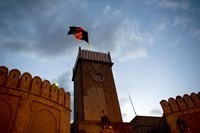In a revealing quirk of history, the crisis in Iraq caused by the sudden onslaught of the Islamic State of Iraq and Syria (ISIS) can help us better understand possible scenarios for Afghanistan moving forward. Despite their many differences, both countries are exposing the consequences of America’s decreased leverage combined with the rising but often mutually competing influence of other powers.
Notwithstanding the desire of both Iraqi and U.S. leaders to keep U.S. forces in Iraq beyond 2011 in order to train and equip Iraq’s still developing security forces, domestic political opposition in both countries combined with flawed diplomatic negotiations led to a complete U.S. military withdrawal from Iraq at the end of that year.
For a while the outcome seemed acceptable, but in recent months the spillover from the war in neighboring Syria into Iraq combined with the misguided political leadership in Baghdad led to increasing political polarization and growing sectarian-fueled terrorist violence. This process, not always visible in Washington, has now culminated in a full-scale civil war that threatens to be as violent as the one in neighboring Syria.

